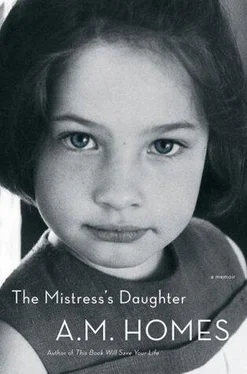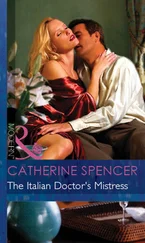It is strange information to have about your father. We’ve just met and he’s telling me about his dick. What he’s really telling me, I guess, is that he’s distanced himself from his Jewish half and that he’s obsessed with his penis. He goes on to tell tales of his great-grandmother, a nineteenth-century East Prussian princess, and other relatives, who were plantation owners on the Eastern Shore of Maryland — slaveholders. He tells me I’m eligible for the Daughters of the American Revolution. He says that a family member, a British admiral, came over on either the Arc or the Dove and that there’s also a connection to Helmuth von Moltke, who according to Norman said, “We will leave them with only their eyes to cry with,” when leading Prussian soldiers into France in 1870. Then he goes on about our connections to the Nazis and the Death’s Head Troops, as though they are something to be proud of.
“And the Dragon Lady isn’t Jewish either. She likes to think she is, but she went to Catholic school.” They are both half Catholic, half Jewish. He identifies as one and she as the other.
He tells me how beautiful Ellen was when she came to work in his store. When I mention the age difference between them — she was in her mid-teens, he was thirty-two — he gets defensive, saying, “She was a slut who knew more than her years — things a young girl shouldn’t know.” He blames her for his lack of self-control. I ask if it ever occurred to him that something might be going on in her mother’s house, something with the stepfather. He shrugs it off, and then, when pressed, says, yes, she tried to tell him something, but he didn’t really know what she was talking about, and yes, maybe there was something going on at home and he probably should have tried to find out.
I ask him about their relationship: How often did he see her? Did he ever really think he might leave his wife?
He is sweating, stuffed into his good suit.
His wife knew about the affair. Ellen has told me that. Ellen has also told me that Norman sometimes brought his oldest child along when they went out. She met the younger ones too but never knew them very well.
Did Norman think he was such a big guy that he could have it all? I picture the affluence of the early sixties, highball glasses and aqua blue party dresses, Cadillac convertibles, big hair, Ellen doing a kind of demented Audrey Hepburn girl thing, Norman the swaggering football hero and veteran, the guy with a gleam in his eye, a wife at home, a young girl on the side, thinking he’s got the good life.
“And what did you do for fun?” I ask, and he just looks at me. The answer is evident. Sex. The relationship was about sex, at least for him. I am the product of a sex life, not a relationship.
“She had a problem,” he says. “She was a nymphomaniac. She went out with other men, lots of men.”
Here I believe Ellen. How much of a nymphomaniac could a fifteen-year-old schoolgirl be? She was clever, crafty, probably trained by an expert — her mother. (I have a mental picture of Ellen’s mother as Shelley Winters playing Charlotte Haze in the film version of Lolita .) But what Ellen looked for in Norman was comfort.
It is clear that Norman is still taken with Ellen. He asks me about her in great detail. I feel like the child of divorced parents — except that I have no idea who these people are. I have no idea what they are talking about. And what they are most interested in is talking about each other.
He tells me that he and his wife wanted to adopt me, and that Ellen wouldn’t allow it. “I wanted to take care of you,” he says. “After it happened, after she’d given birth, I heard that you were a boy.” He looks at me as if there’s something to be said.
“I’m not,” I say.
“I guess it’s good we didn’t adopt you. My wife might have taken it out on you, she might have treated you badly.”
“Yes, it’s good.”
“She told me she was pregnant the day my mother died.”
Later, I ask Ellen about these things and she is furious. “He was never going to adopt you. He never even suggested it. I made the arrangements myself and never told him what I was going to do.”
“Did you tell him you were pregnant the day his mother died?”
“Yes,” she says, and there is the defiant flick of a lighter, the suck of a cigarette.
I change the subject. “Ellen told me about her father,” I say to Norman. “She was very close to him and he died of a heart attack.”
“He didn’t die of a heart attack,” Norman says, indignantly. “He was the White House bookie and he died in a shoot-out with another bookie.” It makes sense. It explains a part of the story that Ellen couldn’t really explain, something about men carrying her father into the house, him dying upstairs, and the family having to stay at a fancy hotel for a while.
I remember an early school field trip to Ford’s Theatre — the image of Abe Lincoln being shot and then carried across the street to Petersen’s Boarding House to die.
I am relieved that Ellen’s father didn’t have a heart attack. There are criminals in my past, but at least their hearts are strong.
“Tell me about your people,” Norman says. He asks about “my people” as though I was raised by wolves. Clearly, my people are not the same as “his people.”
“My people,” I tell him, “are lovely. You couldn’t ask for better.” I owe him nothing. My people are Jews, Marxists, socialists, homosexuals. There is nothing about me, about my life, that he would understand.
We are winding down. I am exhausted.
“I’d like to take you into my family, to introduce you to your brothers and sister. You have three brothers and a sister. But before I can do that, my wife wants everything to be clear. She wants a test to prove that you are my child.
“Would you consider a blood test? You wouldn’t have to pay for it.” It’s the “You wouldn’t have to pay for it” that throws me. Is this what I get as my big reward, the reparation for the wrongs of the past — a DNA test? And what’s behind Door Number Three? Insulting as this is, on some level I can’t blame him. Throwing it to science might be a good idea — it might make fact out of what feels like fiction.
“I’ll think about it,” I say.
“Fine thing.”
In the middle of July 1993, I agree to the DNA test. Norman and I make a plan to meet at a lab. I take the train to D.C.
It is less a lab and more a collection center, a bureaucratic black hole, the most generic office ever made. The fluorescent lighting works like an X-ray throwing everything into relief.
Norman is there waiting — the only white man in the room. It’s the first time I’ve seen him since the lawyer’s office. We sit next to each other, the metal chairs are linked together — forced closeness.
We wait.
They call Norman’s name. He tries to give them a personal check, but they won’t take it. There are signs everywhere detailing how payment is to be made: all checks must be certified. He offers to get them the cash, but they can’t accept cash, only certified checks. He goes to the bank downstairs and for some reason is unable to get one. He returns, flustered, humiliated. He insists that the technician make a call, that he try to get an exception, but it is all to no avail. The check and the blood must be sent together. Because this test is often part of a lawsuit, the lab insists on being paid in advance to avoid the complication of collection. This is the stuff of murders, rapes, proof. Are you or are you not my father?
The next morning we try again.
“Long time no see,” I say.
“What if we get in there and the nurse is the Dragon Lady? She’ll come at us with a square, blunt-tipped needle,” Norman jokes nervously. I laugh but it is not funny. We have a tacit agreement not to tell Ellen what we are doing. What we are doing is insulting to her.
Читать дальше












